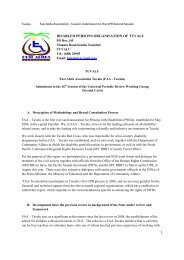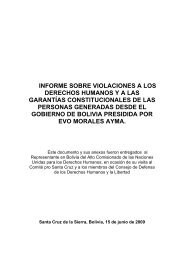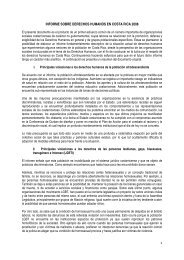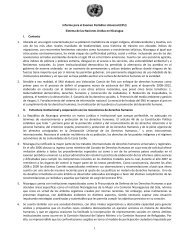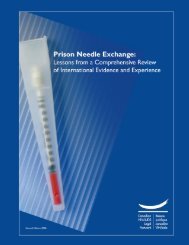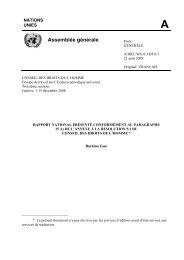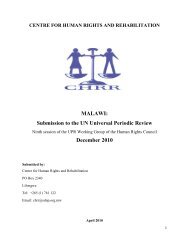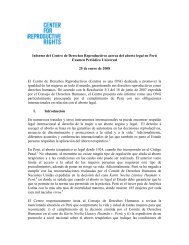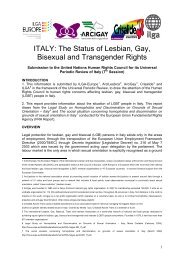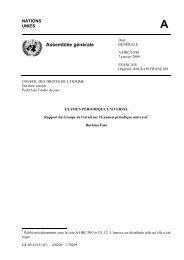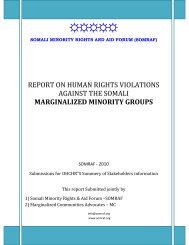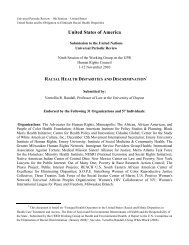JOINT STAKEHOLDERS REPORT ON - Universal Periodic Review
JOINT STAKEHOLDERS REPORT ON - Universal Periodic Review
JOINT STAKEHOLDERS REPORT ON - Universal Periodic Review
You also want an ePaper? Increase the reach of your titles
YUMPU automatically turns print PDFs into web optimized ePapers that Google loves.
wells to fetch water till the non- SCs finish fetching water. SCs are disentitled and not<br />
allowed to use taps and wells located in non-SC area. Entire SC villages are starved of<br />
drinking water for several days as punishment in case the SCs oppose or break existing<br />
norms or practices of discrimination in the village.<br />
25. Adequate Housing: The use of inferior building materials, high population density, lack<br />
of access to civic services, and spatial segregation in residential areas are clear indications<br />
of the poverty, existing social discrimination and marginalization in general, and the<br />
housing and living conditions in particular of the SC communities. During attacks targeted<br />
at SCs, burning of homes and destruction of property and farmland is a tactic commonly<br />
used by dominant castes. Land or property disputes, with punitive action seldom taken<br />
against the perpetrators, are one major reason for targeting SC houses. 25 SCs also find it<br />
extremely difficult to rent houses, especially in urban areas, and they are the ones worst<br />
affected in demolition or evacuation incidents. During the Common Wealth Games<br />
(CWG) in New Delhi in 2010, the urban poor, of whom the SCs constituted the majority,<br />
were forcefully evicted without any concrete alternate re-settlement plan. One case in<br />
example was the slum cluster of 368 families of Dalit families at Jangpura‘s Barapullah<br />
Nullah, New Delhi which was demolished to construct a car parking area for CWG.<br />
26. Right to Education: Literacy levels are lowest among SC girls at 24.4 per cent, compared<br />
to the national average of 42.8 per cent for the female population. In the Mushahar 26 SC<br />
community, barely 9 per cent of women are literate. One of the primary reasons for the<br />
increasing dropout rate of SC children from primary schools 27 (50% of all SC children,<br />
and 64% of girl students dropout) is due to discrimination being practiced against them in<br />
school. The difference in dropout rates between SC youth and all Indian youth has actually<br />
grown from 4.39 % in 1989 to 16.21 % in 2008 28 .<br />
27. Discrimination in Higher Education: The caste bias manifests itself in the way teachers<br />
ignore SC students and unjustly fail them in exams, in social exclusion and physical abuse,<br />
and in the unwillingness of the university administration to assist SC and support them. As<br />
a grave consequence of this harassment, a disproportionate number of SC students have<br />
committed suicide. 18 SC students have committed suicide between 2008-11 and this<br />
number only represents the official cases. Counting all the SC students whose families did<br />
not protest against the incessant discrimination that eventually led to suicide, the number<br />
is likely to be much higher 29 .<br />
28. SC Children: SC children are frequently treated in a humiliating and degrading manner in<br />
school and in public places, at times accompanied by severe corporal punishment. Even in<br />
government sponsored schemes like the midday meal scheme, they are made to feel they<br />
are ―children of a lesser god‖, with segregation in seating arrangements and in eating<br />
midday meals, being made to clean the school toilets and carry their footwear in their<br />
25<br />
Briefing Paper for the Special Rapporteur on Adequate Housing as a component of the right to an adequate standard of<br />
living, WGHR, June 2010<br />
26<br />
The Musahar community falls under the category of the Scheduled Caste in Northern India, is socially and economically<br />
one of the most marginalized communities in India.<br />
27<br />
Discriminatory practices against SC children practiced by teachers include corporal punishment, denial of access to<br />
school water supplies, segregation in class rooms, and forcing Dalit children to perform manual scavenging on and<br />
around school premises (IDSN and Navsarjan Briefing Note, 2010).<br />
28<br />
IDSN, 2010: Dalit Children in India – Victims of Caste Discrimination, Briefing Note by Navsarjan Trust<br />
(www.navsarjan.org), Center for Human Rights and Global Justice (www.chrgj.org) and International Dalit Solidarity<br />
Network (www.idsn.org)<br />
29<br />
The Death of Merit, 2011: On Suicides, Caste and Higher Education<br />
8



